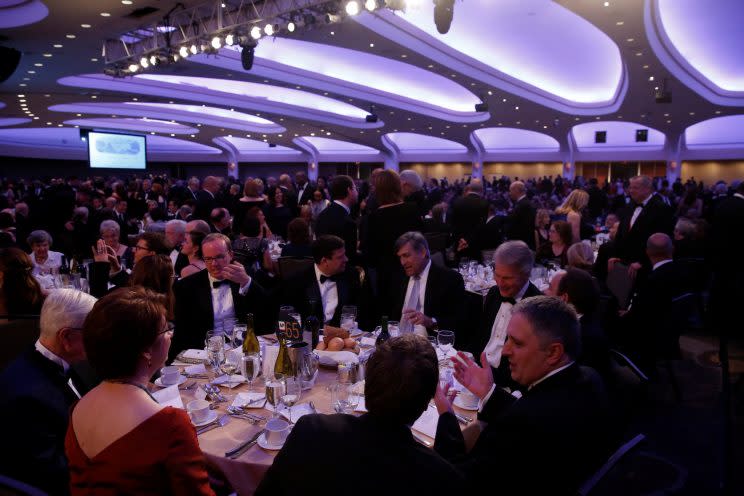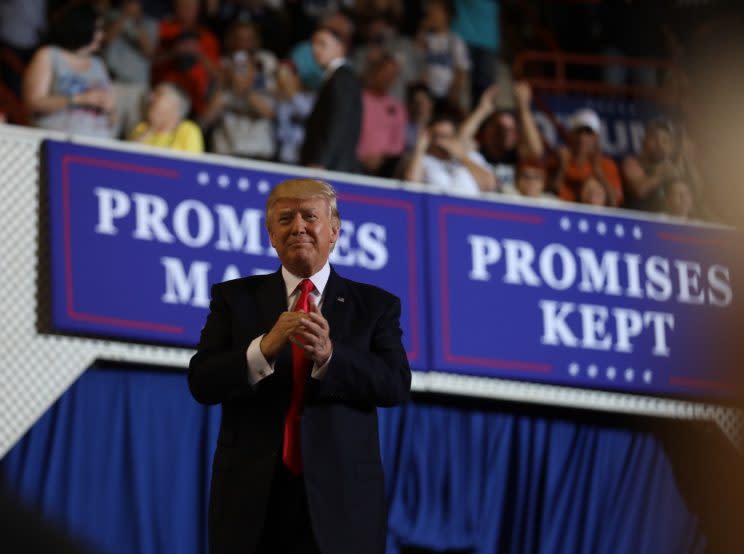Trump celebrates 100-day mark by railing against the media — and seeking to steal spotlight from D.C. gala
HARRISBURG, Pa. — President Trump was here to celebrate the achievements of his first 100 days in office, but first, he had a few words to say about the news media — more than a few words, actually.
Taking the stage at a farm expo center here before a packed crowd of several thousand people in a key swing state he won last November, Trump spent the first quarter of his speech — nearly 15 minutes — railing against the “incompetent, dishonest” media that he claimed had been “purposely negative” about his first months in office.
“If the media’s job is to be honest, they deserve a big, fat failing grade,” Trump declared in a scathing rant that prompted his supporters to turn around and boo reporters on the scene to cover his remarks.
What seemed like every grievance Trump has held against reporters spilled forth. He called CNN and MSNBC, two of his favorite targets, “fake news.” The “failing New York Times,” a paper that Trump has given repeated interviews to since he won the election last November, was struggling so badly it was “starting to look like a comic book,” he insisted — though the paper has reported a jump in subscriptions since he took office.
He repeatedly attacked the media as “out of touch” with the concerns of everyday Americans and questioned why any reporter had any right to judge him. After three months of speeches in which Trump had continued to relive last year’s election and rail against onetime rival Hillary Clinton, the president had finally settled on a new foe: reporters.
Saturday’s rally was Trump’s latest attempt to offer counterprogramming to his perceived opponents, a card he regularly played during the 2016 campaign. In this case, Trump’s target was the hundreds of political journalists gathered in Washington for the annual White House Correspondents’ Dinner. On Saturday, Trump became the first president in 36 years to skip the dinner, eschewing reporters he has regularly attacked as “fake media” and even the “enemy of the American people” amid his constant complaints of unfair coverage.
(The last president to skip the event was Ronald Reagan in 1981, when he was recovering from an assassination attempt, though he still managed to call in and deliver a few jokes. “If I could give you just one little bit of advice,” Reagan said from Camp David, the presidential retreat, “when somebody tells you to get in a car quick, do it.”)

Speaking to supporters here, Trump bragged about ditching the dinner, which funds scholarships for journalism students, describing it as a gathering of “Hollywood actors and Washington media … consoling each other in a hotel ballroom.”
“I could not possibly be more thrilled to be more than 100 miles away from Washington spending my evening with all of you, a much larger crowd and better people,” Trump declared, adding that the dinner was probably “very, very boring.”
It wasn’t the first time the TV-savvy politician has tried to split-screen another prominent event. In January 2016, just days before the Iowa caucuses, Trump abruptly scheduled a “fundraiser” for veterans to run at the same time as a Fox News GOP primary debate he boycotted over a feud with the network’s Megyn Kelly. And last July, he held rallies during the Democratic National Convention, including on the night of Clinton’s acceptance speech, in an attempt to draw away viewers.
The WHCA dinner, which is also attended by a mix of politicians, celebrities, lobbyists, advertisers and others in the news, has long been viewed as a lighthearted night where the president can roast reporters and vice versa. But for the thin-skinned Trump, it was also the scene of a eviscerating takedown in 2011, when then-President Barack Obama openly mocked the New York billionaire’s political ambitions.
Trump, who at the time was the leading voice on conspiracy theories that Obama was not born in the U.S., was visibly furious. And though Trump has repeatedly denied that he was embarrassed or angry, the episode is said to have cemented the businessman’s determination to seek the presidency and avenge his critics, including Obama.
That desire to prove those who underestimate him wrong has been a driving force for Trump for his entire adult life — from his entry into the gilded world of Manhattan real estate to his unlikely path to the presidency. And perhaps it’s why Trump continues to live in the past — spending at least part of his remarks Saturday night, as he often does in public speeches, relitigating the 2016 election in what seems to be an infinite desire for credit for stunning the world with his surprise victory last year. “Their predictions were so bad,” Trump said of the media, accusing them of pulling for Clinton last year.

While the president delivered a full-throated defense of his early months in office, insisting again and again he is making progress, Trump’s rally in Harrisburg also called attention to what has been a surprising element of his early days in office. For a candidate who rose to power on what he has described as his “movement” and who thrived from the adulation he felt from the massive rallies he held all over the country, Trump has spent little time on the road trying to activate those supporters to advance his political agenda in Washington.
Unlike other presidents who have spent a large part of their early days in office on the road giving speeches and making the case for their political priorities, Trump has spent much of his first months in office at the White House or at Mar-a-Lago, his lavish Florida retreat.
Trump has made just a handful of public appearances outside Washington — including visits to Michigan, South Carolina, Virginia and Wisconsin, where he held small policy events largely to tout job creation. On Friday, he addressed the National Rifle Association convention in Georgia, where he mostly relived his campaign glories. Though aides said he would hit the road to sell his agenda after a speech to Congress in late February, that swing never materialized.
By comparison, Obama had visited roughly 10 states, largely to sell policy initiatives like his economic stimulus package, and traveled overseas three times by this point his presidency. In his first 100 days, George W. Bush was on the road even more, hitting roughly 25 states to sell his push for tax cuts and education reforms like “No Child Left Behind.” He had also traveled to Mexico on his first overseas trip.
For Bush and Obama, their domestic trips weren’t just to friendly territory. Both presidents traveled to states during their first 100 days to target members of the opposing party in hopes of winning bipartisan support for their policy agendas. For Bush, that included trips to Michigan and Montana. Obama traveled to Arizona, home to his political rival, John McCain.
Perhaps most surprising to those who closely followed Trump’s campaign is that, until Saturday’s appearance in Pennsylvania, he had held just three rallies — in Florida, Tennessee and Kentucky, all states that he won easily. That’s less than many expected, given Trump’s obsession with rallies, which were such a source of energy and life for him during his run for the White House that many within his campaign wondered if he would be able to give them up and focus on governing.

White House press secretary Sean Spicer has told reporters that Trump’s lack of travel in support of his agenda is because he is focused on matters in Washington. But others within the president’s party point to other reasons, including a policy agenda that has lacked clarity and focus and a commander in chief who often struggles to stay on script.
“When you are president, you travel to make a point,” one Republican party official who declined to be named critiquing Trump’s style. “And if the campaign is any guide, maybe the determination has been that he would step on that point, and it’s just not worth it.”
While Trump has mastered the ability to whip up his supporters through other means like Twitter, his ability to truly activate his supporters in support of his political agenda remains untested.
And much of that agenda remains in limbo after a rocky first 100 days in office. During the campaign, he set his own 100-day “contract” with voters, but he has carried out less than half those promises, according to the Associated Press. Trump, visibly frustrated at times, has lashed out at the courts for blocking his executive orders and at congressional factions for their alleged disloyalty.
On Saturday, Trump went through a litany of campaign promises that he said he’s delivered on, pointing to executive orders aimed at helping the coal industry as well as stepped-up enforcement of immigration laws. He glossed over his failed effort to repeal and replace Obamacare, insisting it would fail on its own eventually. And he again insisted, despite setbacks, that his proposed wall along the U.S.-Mexico border would be built.
“We are keeping one promise after another,” Trump said, touting “historic progress.”
As further proof, Trump motioned to back to the press corps on hand to cover his speech. “They are exhausted,” he declared. “They’ve never seen anything like it.”
Read more from Yahoo News’ coverage of Trump’s first 100 days:
Trump doesn’t talk like other presidents. Would he be a better president if he did?
What Trump has done for, and to, the environment in his first 100 days
The Ever-Trumpers: Revisiting his backers from 2016, we find they still like him
Fact check: The White House’s claims about Trump’s first 100 days
The contrarians: They didn’t vote for Trump, but they would now
Trump foreign policy at 100 days: The downside of unpredictability
Twitter, Mar-a-Lago and Obama-bashing: The 45th president’s 100 days
Photos: From inauguration to 100th day — President Trump’s rocky ride in pictures
Photos: From crude to creative — 100 days of Trump signs wielded by fans and foes


